October 6, 2025
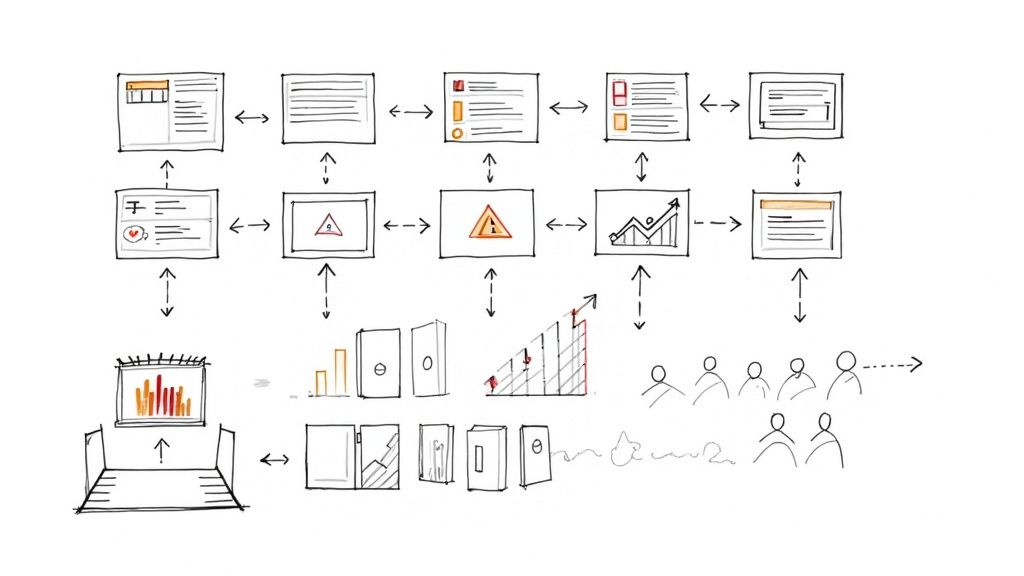
Choosing the right event planning software can be the difference between a seamless, engaging experience and a logistical nightmare. With hundreds of options on the market, each promising to be the ultimate solution, it's difficult to identify which platform truly aligns with your specific needs. A great tool does more than just sell tickets; it streamlines every phase of the event lifecycle, from pre-event marketing and registration to attendee engagement and post-event analytics, ultimately delivering measurable ROI for your organization.
This guide is designed to cut through the noise. We provide a detailed, practical analysis of the best software for event planning, moving beyond marketing claims to offer an honest assessment of what each platform delivers. We'll explore their specific strengths, ideal use cases, and crucial limitations to help you select the perfect partner for your conferences, trade shows, workshops, and community gatherings. For each option, you will find screenshots, direct links, and a clear breakdown of features, pricing, and who it’s best suited for.
While many of these platforms offer all-in-one solutions, sometimes a specialized tool is necessary to enhance a specific function. For instance, you might need more robust functionality for exhibitors and sponsors. Beyond comprehensive event planning platforms, consider dedicated tools that excel in specific areas, such as the best lead capture apps for events. This guide, however, focuses on the core platforms that form the backbone of successful event management. Let’s dive into the top contenders to find the right fit for your organization.
GroupOS positions itself as a premier, all-in-one solution, making it a powerful contender for the best software for event planning, especially for organizations building a community around their events. It moves beyond simple event logistics to offer a comprehensive platform that integrates membership management, ticketing, content delivery, and ongoing communication into a single, cohesive ecosystem. This unified approach is ideal for professional networks, associations, and corporate event organizers who aim to cultivate long-term engagement rather than just manage one-off occasions.

The platform's standout capability is its creation of fully custom-branded mobile (iOS and Android) and web applications. This white-labeling provides a premium, professional experience that reinforces your brand identity and keeps your community centralized in a dedicated digital space. Its event management tools are robust, featuring a dynamic ticketing system with custom checkout forms, tiered pricing, and VIP upgrades to maximize revenue. Practical features like QR code check-ins and a drag-and-drop page builder streamline administrative tasks, demonstrably reducing workload by up to 30%.
GroupOS truly shines in its ability to extend the event lifecycle. Post-event, the platform transforms into an engagement hub with features like live chats, dedicated channels, and a resource center for on-demand videos and documents. This is invaluable for associations needing to provide continuous value to members. For exhibitors and sponsors, dedicated profile pages and product showcases create a targeted lead-generation environment, a critical component often overlooked by simpler event tools. For a deeper dive into the core functionalities, you can explore more about what event management software entails on the GroupOS blog.
Website: https://groupos.com
Cvent is an undisputed giant in the event management technology space, offering an enterprise-grade, all-in-one platform that handles the entire event lifecycle. It is widely considered one of the best software for event planning for large-scale, complex events and multi-event portfolios, making it a go-to for corporate and mid-market teams. Its power lies in its comprehensive, integrated ecosystem that connects every touchpoint, from initial venue sourcing to post-event analytics.
The platform excels at managing intricate registration logic, sophisticated agenda building with multiple tracks, and integrated payment processing. For attendees, the "Attendee Hub" creates a unified experience for virtual, hybrid, and in-person events, featuring tools like live Q&A, polling, and networking. Onsite, the "OnArrival" solution streamlines check-in and provides on-demand badge printing, a critical feature for large conferences.
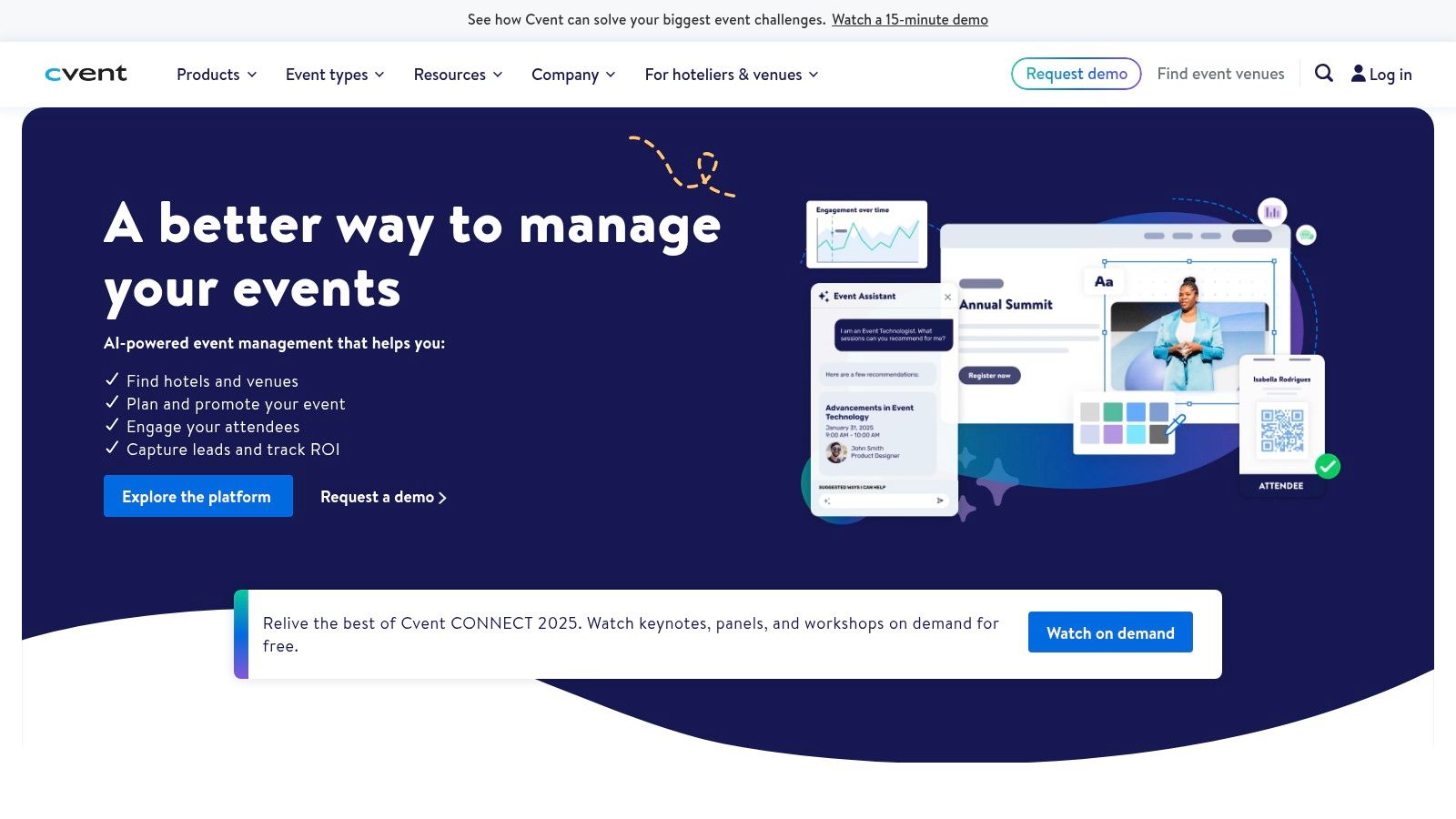
Cvent's standout feature is its vast Cvent Supplier Network, an industry-leading venue sourcing tool that allows planners to send RFPs and compare bids from hotels and venues worldwide. This integration alone saves significant time in the planning phase.
Ideal Use Case: A large corporation planning an annual international sales conference with 2,000+ attendees, multiple breakout sessions, complex ticketing tiers, and a hybrid component for virtual participants. Cvent manages the venue search, multi-faceted registration, attendee engagement, and onsite logistics seamlessly.
Cvent’s pricing is entirely quote-based and tailored to an organization's specific needs, event volume, and feature requirements. It is a premium-priced solution, reflecting its enterprise focus.
Website: https://www.cvent.com/
Eventbrite is a household name in the event industry, known for its self-serve ticketing and registration platform combined with a powerful consumer marketplace. It excels at connecting event creators with a massive audience looking for things to do, making it one of the best software for event planning when public visibility is a primary goal. The platform is incredibly user-friendly, allowing organizers to create and launch a polished event page with multiple ticket types in minutes.
The core of Eventbrite's appeal is its two-sided network. Organizers gain access to a built-in audience and powerful discovery tools, while consumers get a centralized place to find local happenings. This synergy simplifies the marketing challenge for public-facing events like concerts, workshops, festivals, and fundraisers. Its straightforward interface and reliable mobile check-in app make managing simple event operations a breeze.

Eventbrite's most distinctive feature is its event discovery marketplace, which actively promotes public events to millions of users. Combined with marketing tools like Eventbrite Ads, it provides a unique channel for driving ticket sales and reaching a new audience that other platforms cannot match.
Ideal Use Case: A local brewery hosting a public craft beer festival. They need a simple way to sell tiered tickets (e.g., General Admission, VIP), promote the event to the local community, and quickly scan tickets at the gate using a mobile app. Eventbrite's marketplace and ease of use are perfect for this scenario.
Eventbrite is free for free events. For paid events, it uses a per-ticket fee structure that varies by plan (Flex, Pro) and country. In the US, the Pro plan typically includes a 3.7% + $1.79 fee per ticket sold, plus a payment processing fee of 2.9%.
Website: https://www.eventbrite.com/
Bizzabo positions itself as an "Event Experience Operating System," designed for B2B marketers and event professionals who want to create impactful, data-rich conferences. It's a premium, modern platform that excels at integrating marketing, engagement, and onsite technology into a cohesive whole. Rather than just managing logistics, Bizzabo focuses on maximizing the ROI of events by connecting experiences directly to business outcomes, making it a strong contender for the best software for event planning for marketing-driven organizations.
The platform provides a comprehensive suite of tools for in-person, virtual, and hybrid events, including beautiful event websites, flexible registration, and a native mobile app. Its strength lies in its deep integrations with major CRM and marketing automation platforms like Salesforce and HubSpot, allowing for seamless data flow. Onsite, Bizzabo offers innovative solutions like smart badges and streamlined check-in to enhance attendee engagement and lead capture.
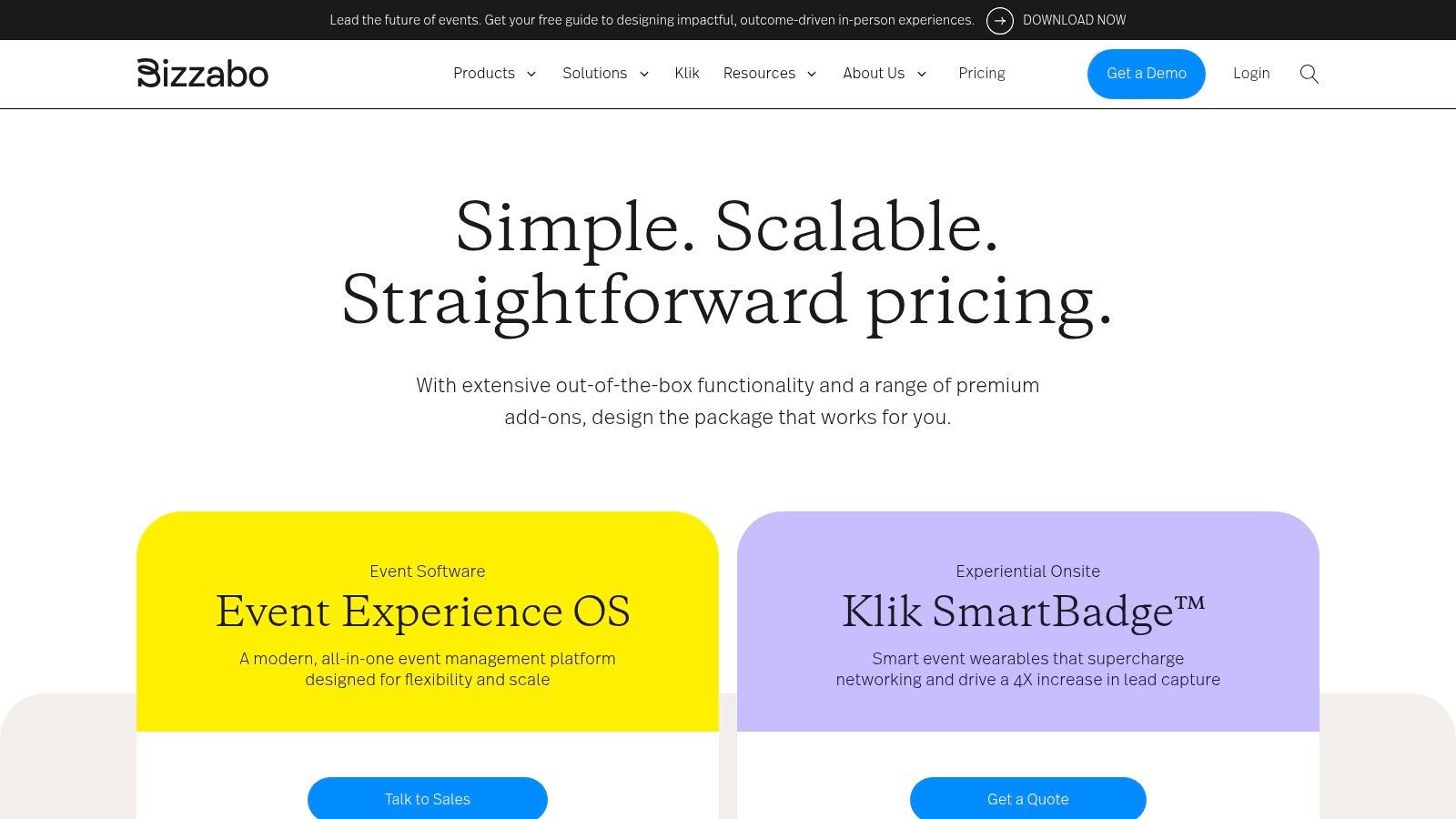
Bizzabo's standout feature is its innovative wearable technology, such as smart badges that facilitate networking and provide organizers with powerful real-time engagement analytics. This focus on data-driven experience makes it exceptionally valuable for proving event ROI. The platform also offers dedicated portals for sponsors and speakers, simplifying communication and content management.
Ideal Use Case: A B2B technology company hosting its annual user conference with a focus on lead generation and demonstrating marketing ROI. They need deep integration with their Salesforce CRM, a high-end mobile app experience, and advanced onsite capabilities like smart badges to track session attendance and booth visits.
Bizzabo offers several pricing tiers, typically billed annually, which include unlimited events and registrations. While they publish their plans online, a final quote is often tailored to specific feature needs, such as advanced production tools or onsite hardware. It is a premium-priced solution aimed at teams with significant event budgets.
Website: https://www.bizzabo.com/pricing
RingCentral Events, which acquired the well-known Hopin platform, offers a robust solution for virtual, hybrid, and onsite events. It stands out by integrating powerful event management tools into RingCentral’s broader communication ecosystem, making it a strong contender for businesses already using their suite. The platform is especially appealing for its pricing model, which often includes unlimited events and registrations based on the number of organizer licenses, a significant departure from per-attendee pricing.
This platform is engineered to create engaging digital experiences. Its core virtual venue features include a main stage for keynotes, breakout sessions for interactive discussions, a networking area to facilitate one-on-one connections, and an expo hall for sponsors and exhibitors. This comprehensive virtual setup has made it one of the best virtual event platforms available. For organizers looking to expand, higher-tier plans add onsite and hybrid capabilities, including check-in and badge printing.
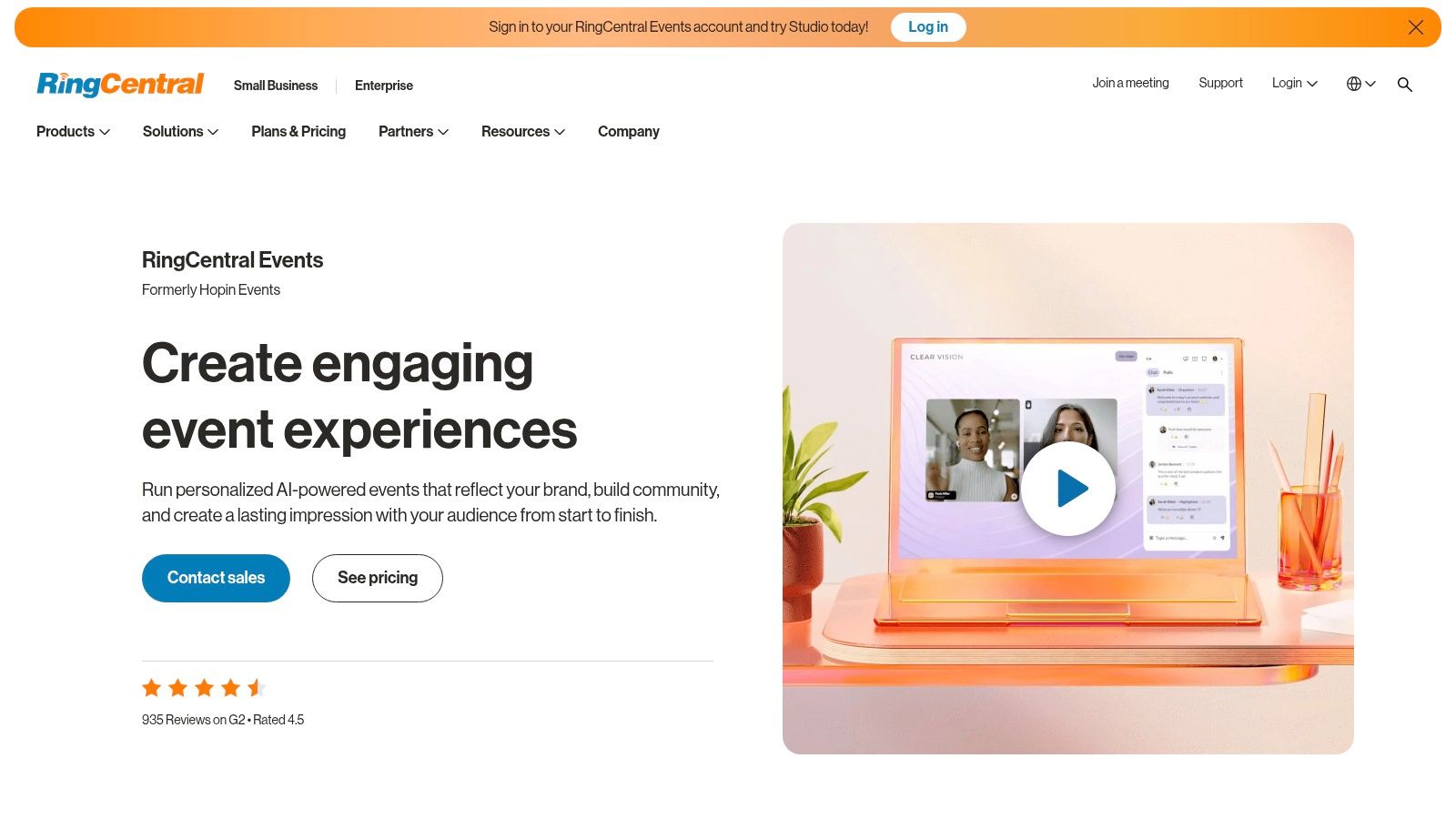
The most compelling feature of RingCentral Events is its per-organizer pricing model, which provides predictable costs by allowing unlimited events and attendees under a single license. This simplifies budgeting and encourages more frequent event hosting without incurring additional attendee-based fees.
Ideal Use Case: A tech company that hosts a frequent series of webinars, product demos, and user group meetups throughout the year. The per-seat license allows them to host unlimited virtual events for their global audience without worrying about fluctuating costs, while leveraging the platform's strong engagement and networking tools.
RingCentral Events offers several tiers, including a free plan with basic features for small events. Paid plans like the Pro+ tier are priced per organizer, per year and unlock advanced features, increased capacity, and onsite/hybrid event capabilities. Specific pricing requires a consultation for an exact quote.
Website: https://www.ringcentral.com/rc-events.html
Zoho Backstage is an end-to-end event management platform that leverages the power of the extensive Zoho ecosystem. It provides a comprehensive suite of tools for running in-person, virtual, and hybrid events, making it a versatile choice for small to mid-sized businesses and even enterprise users already invested in Zoho products. The platform is designed to handle the full event lifecycle, from creating a multilingual event website and managing registration to engaging attendees and analyzing post-event data.
Its strength lies in its seamless integration capabilities and transparent pricing model, which sets it apart from many competitors. Planners can manage email campaigns, create custom agendas, and facilitate networking through virtual lounges and 1:1 chats. For onsite execution, the platform offers streamlined check-in solutions and badge printing, providing a cohesive experience for both organizers and attendees.
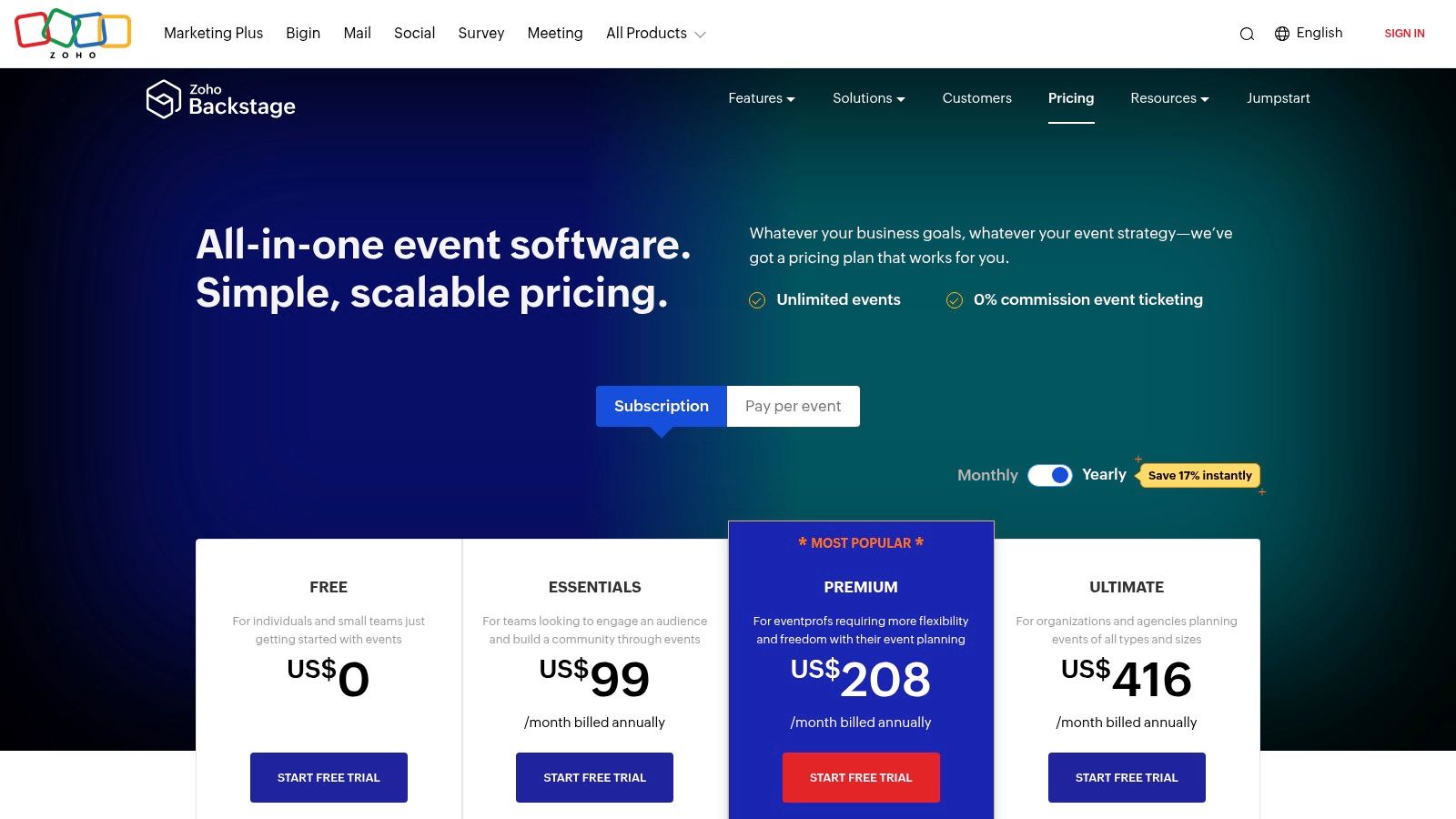
A significant advantage of Zoho Backstage is its zero-commission ticketing, allowing organizers to keep 100% of their ticket revenue. It also integrates natively with tools like Zoom, Webex, and Zoho Meeting for built-in webcasting, simplifying the tech stack for virtual components.
Ideal Use Case: A mid-sized tech company hosting a hybrid user conference. They need to create a branded event website, sell tickets without commission fees, run targeted email campaigns using Zoho Campaigns, and provide a white-labeled mobile app for attendees to network and access session information.
Zoho Backstage offers a 15-day free trial and two pricing models. The "Pay per event" plan starts at $99/event for up to 300 attendees. The "Professional" subscription is $119/month (billed annually) for unlimited events and 1,000 attendees, while the "Enterprise" plan is $239/month for up to 2,500 attendees.
Website: https://www.zoho.com/backstage/pricing.html
EventMobi is a mobile-first event management platform known for its robust, branded event apps and transparent pricing. It excels at creating engaging attendee experiences for in-person, virtual, and hybrid events, making it a popular choice for associations and corporate planners who prioritize mobile accessibility and onsite logistics. The platform is designed to be an end-to-end solution, covering everything from registration and ticketing to onsite check-in and post-event analytics.
What sets EventMobi apart is its practical approach to onsite event needs, offering not just software but also hardware rentals for badge printing and check-in kiosks. This bundled offering simplifies the logistical challenges many planners face. The platform also emphasizes attendee engagement through its highly customizable event app, which includes features like live polling, Q&A, gamification, and networking tools, making it a strong contender for the best software for event planning focused on participant interaction. For those managing event communities, understanding the core duties of a community manager can further enhance the impact of such tools. Learn more about the responsibilities of community managers.
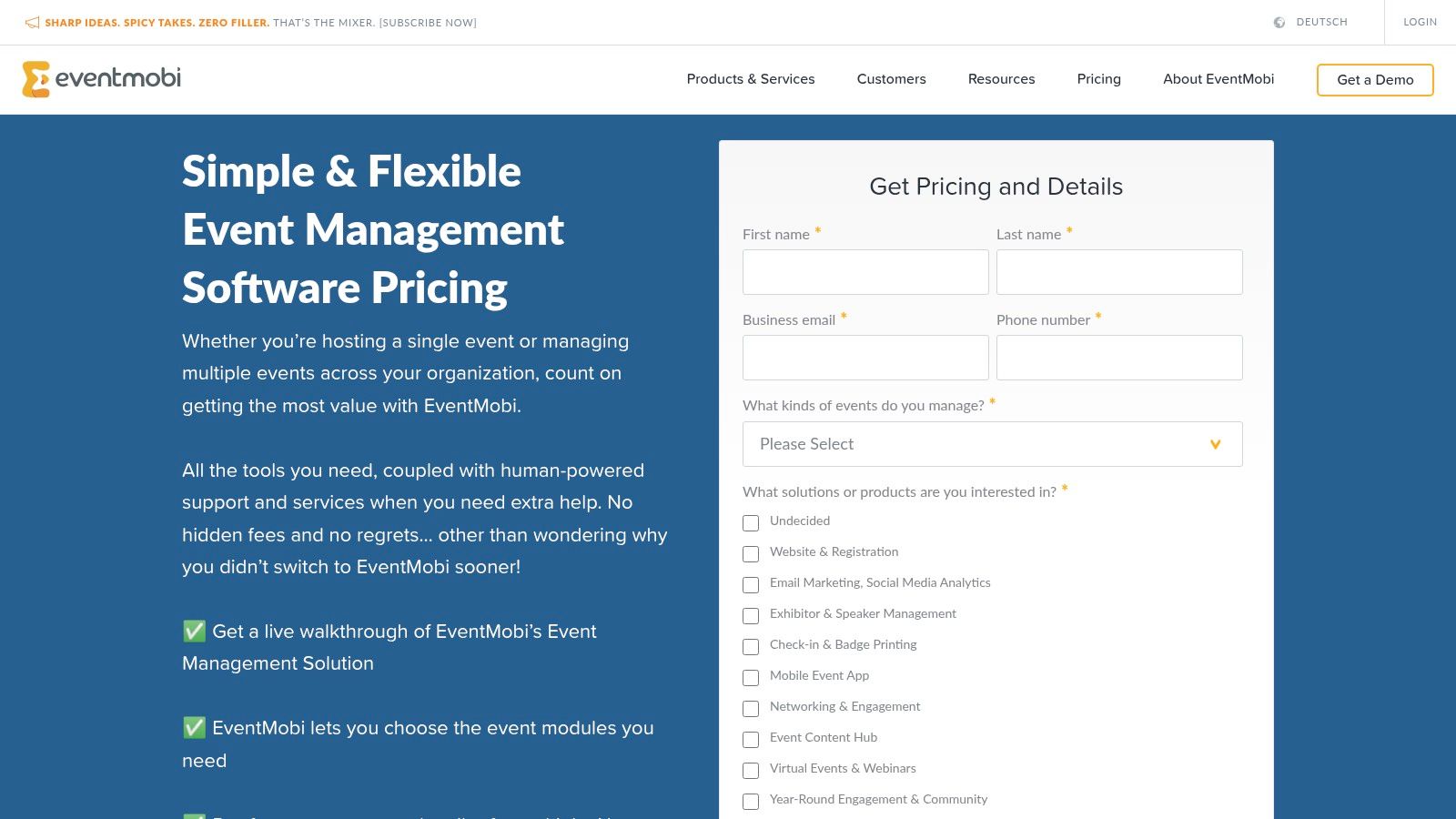
EventMobi's standout feature is its powerful and fully Branded Event App, which serves as the central hub for attendee engagement. The platform also offers registration without platform fees, a significant cost-saving benefit for many organizations.
Ideal Use Case: A national association hosting a 3-day annual conference for 500 members. They need a seamless mobile experience for agendas and networking, plus reliable onsite check-in with badge printing. EventMobi's hardware rentals and app-centric platform provide a unified, professional solution.
EventMobi offers several packages, starting with the "Essential" plan at $3,500 per event. More advanced packages like "Advanced" and "Complete" are available with additional features, and custom pricing is offered for multi-event plans. Optional add-ons like virtual streaming and onsite hardware are priced separately.
Website: https://www.eventmobi.com/pricing/
Splash is an event marketing platform built with a singular focus: creating beautifully branded, high-converting event experiences. While many tools focus on logistics, Splash prioritizes the marketing and guest journey, making it a favorite among field marketers and corporate teams who use events to drive revenue and brand engagement. The platform empowers users to quickly design and launch on-brand event websites, email campaigns, and registration forms without needing a developer.
Its strength lies in its design-forward, template-driven approach that ensures brand consistency across every event touchpoint. Splash is engineered to not just manage attendees but to create a seamless marketing funnel, capturing valuable data and integrating directly with core business systems like Salesforce and Marketo. This makes it one of the best software for event planning when the primary goal is lead generation and pipeline acceleration.

Splash’s standout feature is its powerful design and email marketing suite. Users can leverage advanced design tools and reusable templates to ensure every event page and communication perfectly matches their brand identity, a critical factor for marketing-led events.
Ideal Use Case: A B2B tech company's field marketing team hosts a series of nationwide roadshow events. They use Splash to quickly clone and customize landing pages for each city, manage RSVPs, send branded reminder emails, and sync attendee data directly to their CRM to track ROI and sales influence.
Splash offers a limited free plan for basic events. Paid plans (Pro, Premier) are quote-based and tailored to team size and feature requirements, with pricing often requiring a conversation with their sales team. Paid tiers offer unlimited events and registrations.
Website: https://splashthat.com/pricing
Whova is a highly-acclaimed, all-in-one event management solution particularly praised for its powerful mobile event app and attendee engagement features. It offers a comprehensive suite of tools designed to streamline event organization for in-person, virtual, and hybrid formats. The platform is well-regarded for its user-friendly interface and focus on creating an interactive and connected community experience, making it a strong contender for the best software for event planning for mid-sized conferences and trade shows.
The platform simplifies key planning tasks, from registration and ticketing to onsite logistics. Whova's mobile app serves as a central hub for attendees, providing access to agendas, speaker profiles, maps, and live polls. Crucially, it facilitates networking with features like attendee profiles, a community message board, and one-on-one messaging, which boosts engagement significantly. Onsite, the solution supports name badge generation, check-in, and exhibitor lead retrieval, ensuring a smooth operational flow.
Whova's standout feature is its award-winning Mobile Event App, which consistently receives high marks for attendee adoption and engagement. The app successfully gamifies the event experience, encouraging networking and participation long before the event begins and after it concludes.
Ideal Use Case: A mid-sized industry association hosting its annual 3-day conference for 500 members. The goal is to maximize attendee networking and engagement. Whova's app facilitates pre-event connections, while its onsite check-in and lead retrieval tools streamline operations for both attendees and exhibitors.
Whova offers a transparent registration fee structure for paid tickets but uses a quote-based model for its platform and mobile app licensing, which varies based on the number of attendees and required features. The company also provides special options for non-profit organizations.
Website: https://whova.com/
Eventzilla is an accessible and user-friendly event ticketing and registration platform that strikes a balance between powerful features and straightforward usability. It is particularly well-suited for small to medium-sized businesses, nonprofits, and independent organizers who need robust functionality without the enterprise-level complexity or cost. The platform supports a wide range of event types, from simple workshops and fundraisers to multi-day conferences with assigned seating and virtual components.
The software simplifies the entire registration process with customizable forms, multiple ticket types, and integrated payment processing through gateways like Stripe and PayPal. For more complex events, planners can utilize features like agenda management, reserved seating maps, and dedicated portals for sponsors and exhibitors. Eventzilla also provides essential onsite solutions, including a mobile check-in app, on-demand badge printing, and hardware options like card readers, making it a versatile tool for managing the event from start to finish.
Eventzilla's standout quality is its transparent, pay-as-you-go pricing model, which makes it an excellent piece of software for event planning on a budget. The platform’s Onsite Suite, with tools for check-in, badge printing, and lead capture, provides capabilities often reserved for more expensive systems, empowering smaller teams to run a professional operation.
Ideal Use Case: A nonprofit organization hosting its annual fundraising gala for 300 guests. They need to sell tiered tickets, manage a silent auction, offer reserved seating at specific tables, and efficiently check in guests at the door. Eventzilla provides all these tools with a clear, per-registration fee. You can find more details in this guide to event registration software for nonprofits.
Eventzilla offers a free Basic plan for free events. Paid plans start at $1.50 per registration on the Pro plan, which passes the fee to attendees. The Plus plan includes more advanced features, and custom pricing is available for high-volume organizers seeking unlimited events and attendees.
Website: https://www.eventzilla.net/us/pricing/
While not a software platform itself, G2's Event Management Platforms category is an indispensable research tool for anyone searching for the best software for event planning. It acts as a comprehensive aggregator of real-user reviews, ratings, and comparative data, providing an unbiased, crowdsourced perspective on the market. Instead of relying solely on vendor marketing, planners can use G2 to validate claims and understand how different tools perform in real-world scenarios.
The platform allows you to filter solutions based on specific features, company size, user satisfaction scores, and market presence. Its dynamic Grid reports visualize leaders, contenders, and niche players, making it easy to see who is gaining momentum. This is a crucial first step in the procurement process, helping you build a data-backed shortlist of potential software partners before you even start requesting demos.
G2’s primary strength lies in its real-user reviews and satisfaction scoring. This feature provides unfiltered feedback on usability, customer support, and implementation, offering insights that are difficult to find elsewhere. The detailed vendor comparison tools allow for side-by-side analysis of features and ratings.
Ideal Use Case: An event planning team has been tasked with finding a new registration and mobile app provider. They use G2 to filter for platforms with top-rated mobile apps and strong integrations, read recent reviews from similar-sized companies, and create a shortlist of the top three vendors to contact for a demo.
Access to G2 for research and reading reviews is completely free for users. Vendors pay to list and enhance their profiles.
Website: https://www.g2.com/categories/event-management-platforms
While not a direct event management tool, Capterra is an indispensable resource for finding the right one. It's a comprehensive software review and comparison directory where planners can research, filter, and evaluate dozens of options side-by-side. For anyone tasked with selecting the best software for event planning, Capterra provides a crucial starting point, aggregating verified user reviews, feature lists, and pricing context in one place.
The platform allows you to filter software by specific features like ticketing, mobile apps, or lead retrieval, and by event type, such as conferences or webinars. This granular control helps narrow the field from hundreds of potential tools to a manageable shortlist. Capterra's "Shortlist" reports are particularly useful, offering a visual graph that plots top-rated and popular software based on user reviews and search volume, giving a quick market overview.
Capterra's core strength is its Verified User Reviews system, which provides authentic, peer-driven feedback on a tool's performance, customer support, and ease of use. This peer insight is invaluable for understanding how a platform performs in real-world scenarios beyond the marketing materials.
Ideal Use Case: A mid-sized association needs new event software that integrates with its existing CRM and offers robust membership management features. The event manager uses Capterra to filter for these specific integrations, compares the top 5 contenders side-by-side, reads dozens of reviews, and creates a data-backed report for their leadership team to justify the final selection.
Capterra is a free resource for software buyers. Its revenue comes from software vendors who pay for placement and lead generation, so there is no cost to use the site for research and comparison.
Website: https://www.capterra.com/event-management-software/
Choosing the best software for event planning goes beyond a simple comparison of feature checklists. Your ideal platform must align with your organization’s scale, audience expectations, and long-term community goals. Below, we distill the essential takeaways and offer actionable steps to help you make a confident purchase.
“A unified event planning tool reduces administrative friction and creates a consistent, branded experience from registration to post-event follow up.”
By focusing on how each solution aligns with your unique objectives, you can narrow down your options to the best software for event planning. Whether you need a point solution for ticketing or an all-in-one community hub, prioritize platforms that grow with you. Remember, the right tool is not just about features—it’s about fostering lasting connections and delivering seamless experiences.
Embrace this decision as an investment in your organization’s future. The best software for event planning will become a strategic partner, helping you scale operations, deepen community engagement, and measure success long after the final guest departs.
Ready to elevate every aspect of your events? Discover how GroupOS combines membership management, ticketing, and communication in one platform. Explore GroupOS today and start building unforgettable experiences.


